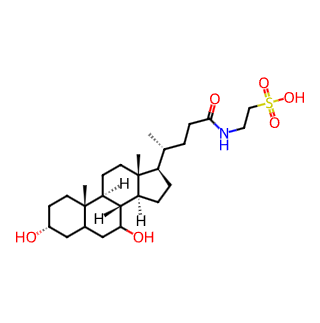- Synthetic anti-infective drugs
- Medications for the digestive system
- Antipyretic and analgesic drugs
- Medications for the blood system
- Medications for the respiratory system
- Anti-allergic drugs
- Medications for the urinary system
- Diagnostic medications
- Immunosuppressive and immunomodulatory drugs
- Vitamins and mineral supplements
- Antioxidants and medications for osteoporosis
- Antiparasitic drugs
- Ophthalmic medications
- Amino acids and their derivatives
- Dermatological medications
- Medications for the circulatory system
- Antitumor drugs
- Medications for the nervous system
- Hormonal and endocrine function-regulating drugs
- Antibiotics
- Others
CAS No.: 14605-22-2




Chemical Information:
English Name: Tauroursodeoxycholic Acid (TUDCA)
Molecular Formula: C26H45NO6S
Molecular Weight: 499.71 g/mol
CAS Number: 14605-22-2
Pharmacological Effects:
1. Hepatoprotective Effects:
o TUDCA is effective in protecting the liver cells against various forms of injury. It reduces endoplasmic reticulum (ER) stress and stabilizes the mitochondrial membrane, which helps in preventing apoptosis (programmed cell death) of liver cells.
2. Anti-apoptotic Properties:
o TUDCA has been shown to inhibit apoptosis by reducing the levels of caspase activation, which plays a critical role in the execution phase of cell apoptosis. This property is particularly valuable in the context of liver diseases and neurodegenerative disorders.
3. Improvement of Bile Flow:
o This bile acid derivative enhances bile secretion and promotes the elimination of toxic bile acids. It is particularly useful in treating cholestatic liver diseases where bile flow is impaired.
4. Reduction of ER Stress:
o TUDCA acts as a chemical chaperone that reduces the stress on the endoplasmic reticulum (ER). This helps in maintaining ER function and cell survival, which is beneficial in conditions associated with excessive ER stress, such as liver diseases and certain metabolic disorders.
5. Neuroprotective Effects:
o The compound is also considered to have potential neuroprotective effects. By reducing ER stress and associated cell death, TUDCA shows promise in the management of neurodegenerative diseases like amyotrophic lateral sclerosis (ALS) and Parkinson's disease.
6. Anti-inflammatory Properties:
o TUDCA exhibits anti-inflammatory effects by downregulating pro-inflammatory cytokines. This property is beneficial in treating chronic inflammatory diseases and conditions.

Tai Yau Street, San Po Kong, Kowloon, Hong Kong, China.



